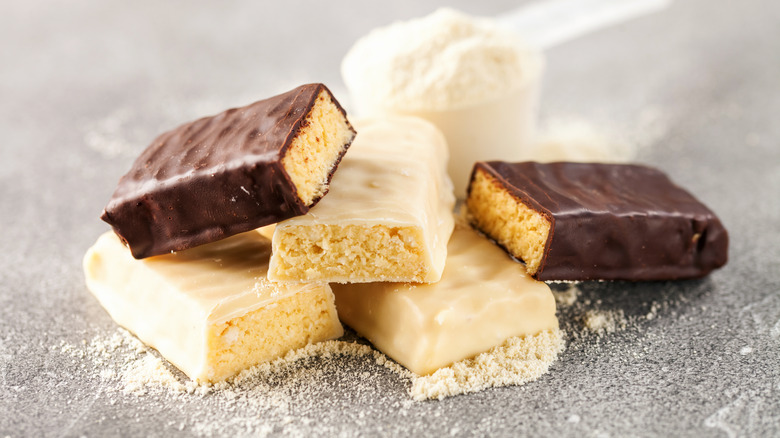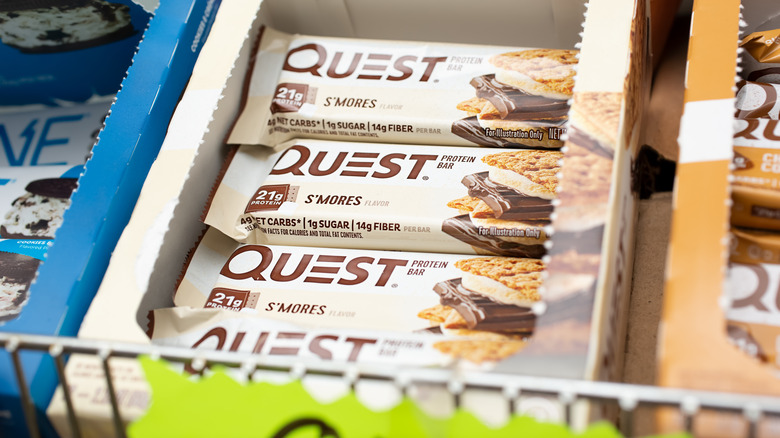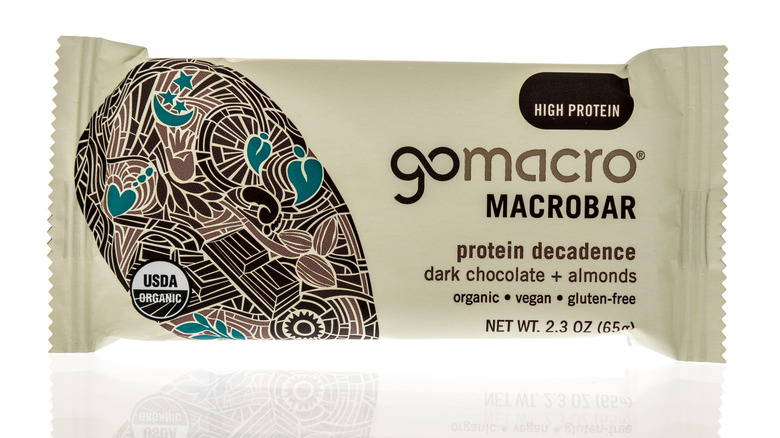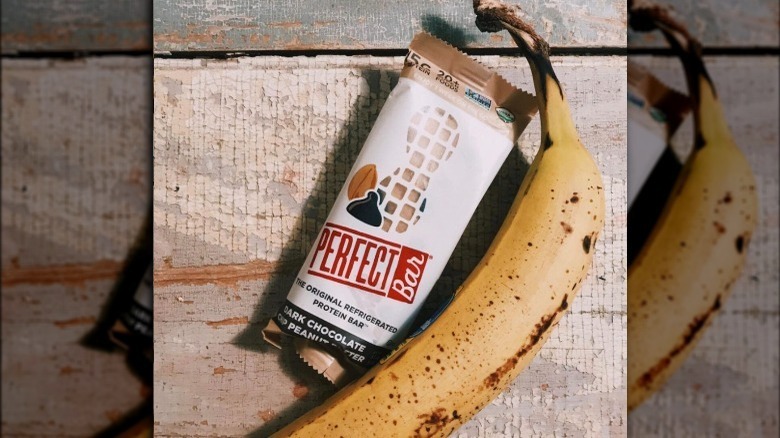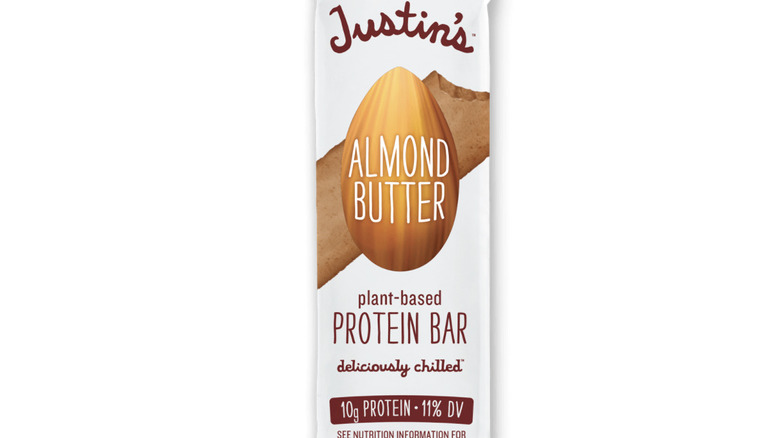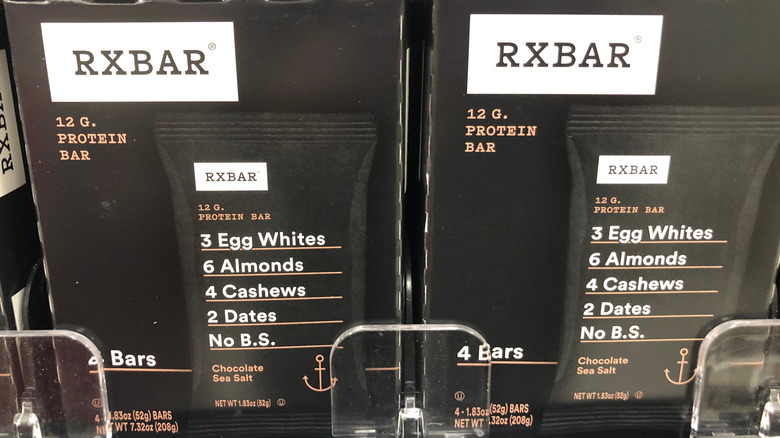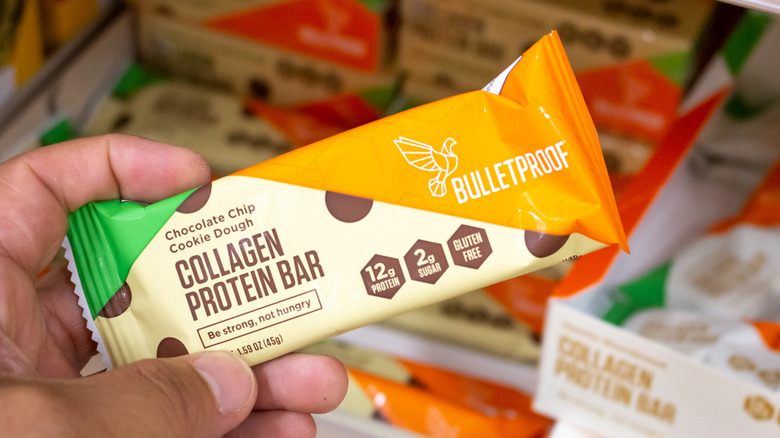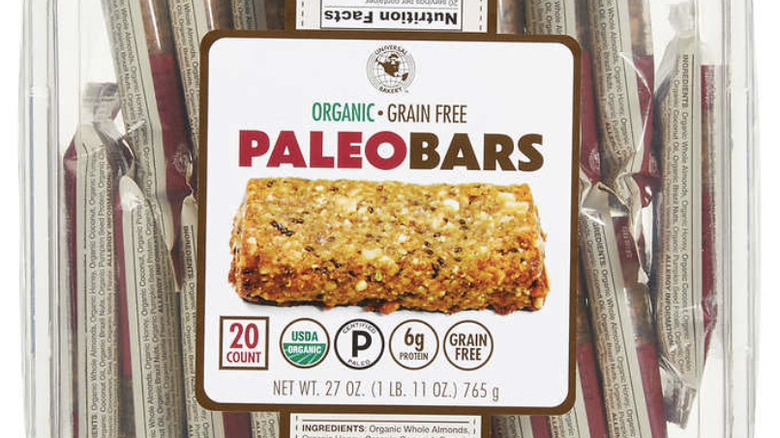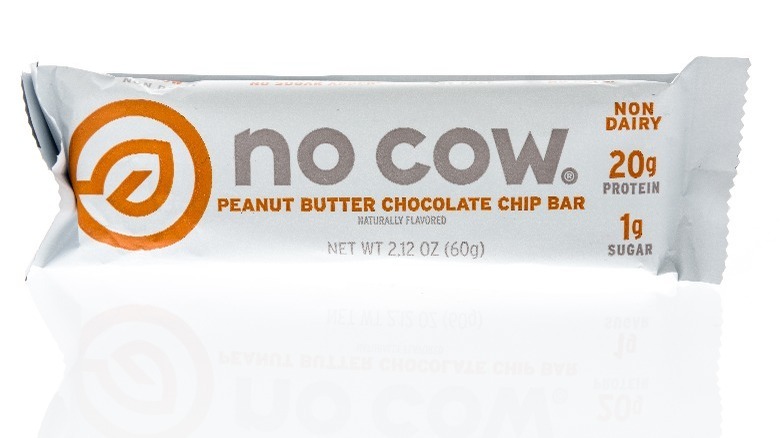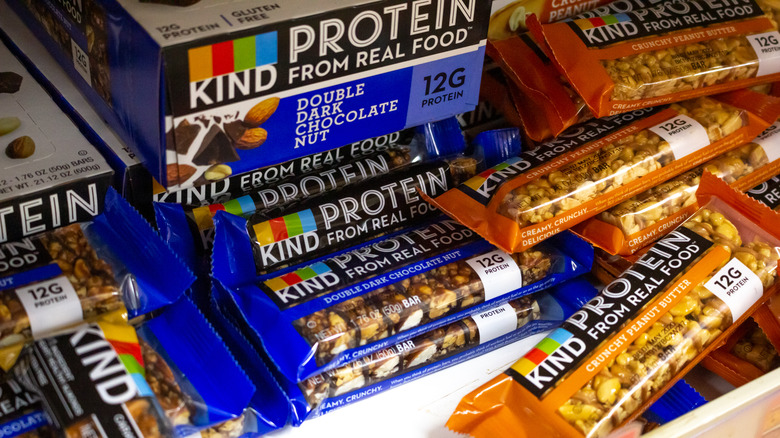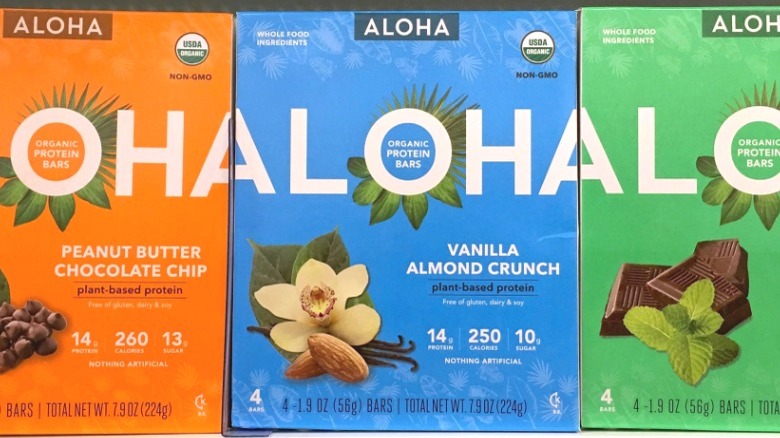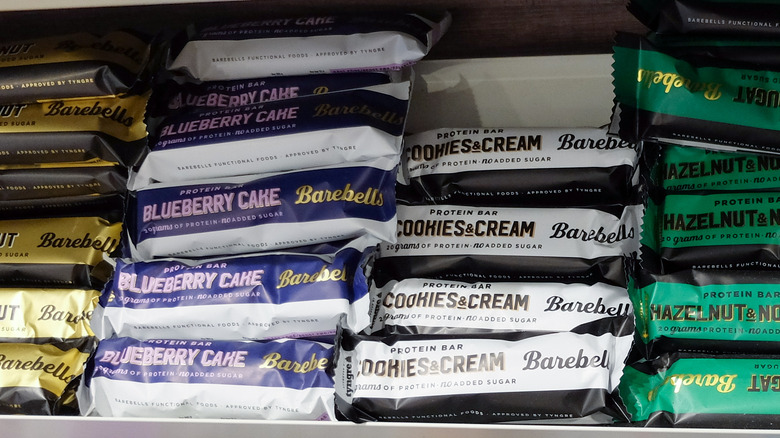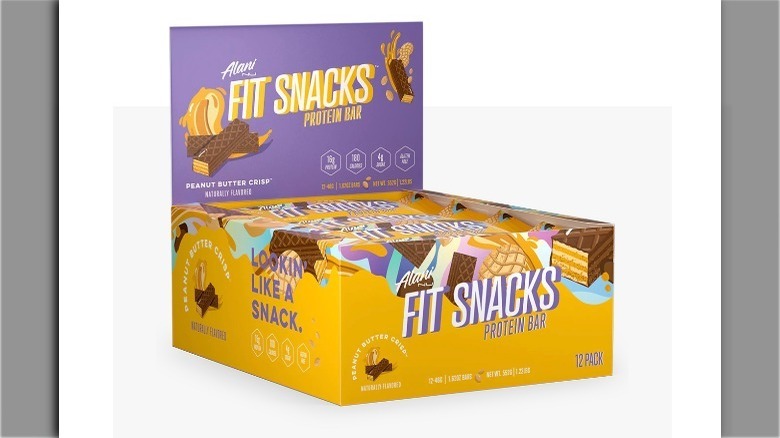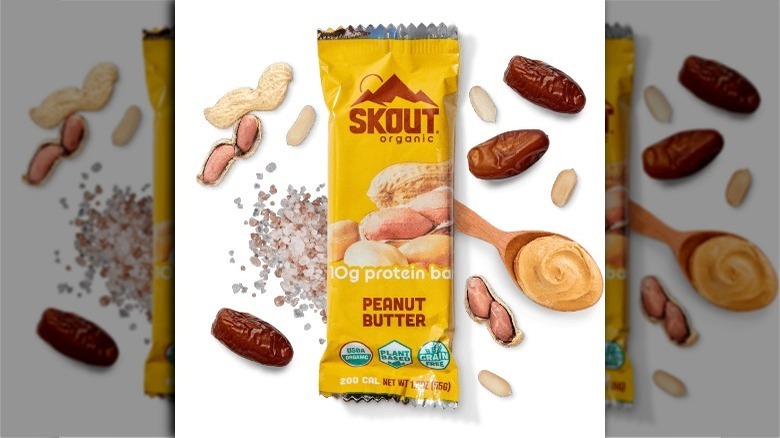Protein Bars That Are Definitely Worth Your Money
The last 40 or so years have given birth to an entirely new type of food: the protein bar. Consider that they often now take up a whole section in the grocery store that simply didn't exist decades ago. Meanwhile, protein bars have overtaken carts nationwide, potentially putting a dent in budgets but ultimately streamlining lives.
This recently created item has a serious range. From breakfast to snack to dessert (and, in a moment of absolute necessity, dinner), it can be whatever you need it to be, as you sprint through your schedule. Just get comfortable with the idea of shelling out $3-6, then unwrap and go. Even though they technically came of age in the 1980s, according to The Bar Shack, it often feels like protein bars were ready-made for this hectic modern era.
Of course, as the nomenclature might lead you to believe, there's more to these bars than just their convenience. Rather, they are made to deliver a protein hit and deliver they do. But, as is often the case with newer and trendy foods, not all protein bars are built on equal footing. Some are pretty good, while others are little more than a waste of your hard-earned cash. Read on for our roundup of the ones that are absolutely worth spending your money on.
Quest Bars
Quest Bars are a nearly legendary creation. Walking the line between small meals, dietary supplements, and dessert, these bars are at once both a before and after workout hack and also unbelievably delicious. Packing an average of 20 grams of protein per bar, Quest Bars are ideal for athletes, sure, but they're also suited for anyone who's generally aiming to up their protein ante. Plus, in a unique turn of events, these bars average out at remarkably high levels of fiber on top of their protein content. The Blueberry Muffin flavor, for example, has 15 grams of fiber, so not only is your body enjoying the energy from the protein, but it's also a bit easier to digest due to all that fiber to help keep things moving.
Quest entices even the most protein bar-averse consumers by dreaming up an array of flavors that are undeniably delicious, and marketing said flavors as easy to incorporate with any number of desserts. The Peanut Butter Brownie Smash flavor, for example, is practically made to be warmed in the microwave and spooned out of a bowl with vanilla-flavored ice cream as a bit of a protein-rich treat.
GoMacro Bars
A GoMacro bar has the consistency of thickly rolled cookie dough, and the sweetness to match, all while still being exponentially more nutritious. The brand, which came about in 2004 according to GoMacro, was founded by mother-daughter duo Amelia and Jola in the wake of Amelia's breast cancer diagnosis. As part of her fight against cancer, Amelia adopted a plant-based macrobiotic diet and, with the help of her daughter and a couple of other medical treatments, ended up beating the disease.
In the 18 years since Amelia invented the original recipe, GoMacro has grown considerably. The company now offers 13 different flavors. Our personal favorite, the Maple Sea Salt, has 12 grams of protein per bar — not to mention it is vegan, kosher, and non-GMO. Somehow Amelia, Jola and the other experts at GoMacro have packed all this goodness into a 15-bite bar that pairs well with just about anything. Pro tip: eat the Oatmeal Chocolate Chip flavor with a cup of coffee in the morning for a quick but filling breakfast.
Perfect Bars
The name sums up this bar, well, perfectly. Crafted from an old family recipe — father Bud used to whip up the beta version of this bar for his family of 13 on their road trips — you've probably seen Perfect Bars hanging out at the Starbucks checkout. They made their debut in the ultra-popular coffee house and quickly rose to fame after that. Forbes even picked up their epic saga, writing about how, when their dad got cancer, all 13 siblings in the Keith family banded together to create this company, now worth $300 million dollars.
But the story is not the only thing that's stellar, here. Really, the crux of Perfect Bars' success is the sheer wonder of both their flavor and texture. The bars, which come refrigerated and crumble in magnificently with every bite, are thick and sweet and original. Perfect now offers 12 different flavors, but you need not stray far from the two most popular (the ones you've likely seen while grabbing a cold brew) Peanut Butter and Dark Chocolate Chip Peanut Butter.
Justin's Almond Butter Protein Bars
Justin's Refrigerated Almond Butter Protein Bars may feel familiar. They are reminiscent of Perfect Bars, after all, in that they typically come straight from the fridge and rather cold, but these fairly new inventions have their own unique twist. Instead of packing in peanut butter to their core offerings, Justin's builds on what the company already does best: almond butter.
Using Justin's signature almond butter, the protein bar ties together 10 grams of plant-based protein and dynamic, rich flavor. There are three varieties: Dark Chocolate Chip Almond Butter, Honey Almond Butter, and old faithful, the classic just-plain Almond Butter. In order to cut back on sugar (Justin's bars have 40 percent less sugar than "leading refrigerated bars," according to the brand), the nut butter experts use organic maple syrup to sweeten their plain almond butter bar and organic honey to sweeten their dark chocolate chip and honey varieties.
Justin's Refrigerated Almond Butter Protein Bars are free of almost everything: gluten, soy, dairy, and they're also non-GMO. Fans of almond butter will love this innovation.
RX Bars
RX Bar lays it all out there, literally. Look no further than the front of their wrapper to find out exactly what's in your bar.
This brand was a standout in the grocery store's protein bar section from the get-go due to their powerfully designed packaging which, in large, bold font, lists all of the ingredients in the bar. With no more than four lines of ingredients and their signature "No B.S." closer, RX Bar made waves and also raised awareness for just how many ingredients protein bars can (and often do) have. This was their intention, they say. In 2013, according to RX Bar, "We couldn't believe there wasn't a more nutritious and simpler protein bar out there. Maybe we were a little naïve, but we decided to stop talking and try to make it ourselves."
Now, 17 flavors later, RX Bar is undoubtedly one of the most virally successful brands on this list. They offer everything from Mixed Berry to Mint Chocolate to our personal favorite, Peanut Butter, all with a seriously pared-down ingredients list.
Bulletproof Collagen Protein Bars
Bulletproof is perhaps one of the most unconventional and bold brands on this roundup. While RX Bars started with bars, and Justin's started with almond butter and other nut-based spreads before creating a competitive bar, Bulletproof's origins lie somewhere completely different and pretty darn unexpected: coffee.
In 2011, Dave Asprey created Bulletproof Coffee by blending coffee with MCT oil and grass-fed butter. Drinking a bit of (relatively healthy) fat with a cup of Joe seemed like a foreign concept at the time, but somehow the product sold. Now, the Bulletproof line of products includes everything from protein powder to a zinc supplement to, of course, their collagen protein bars.
Like the rest of the line-up, Bulletproof Collagen Protein Bars take an innovative approach to nutrition. They are made with grass-fed collagen protein, so not only are you getting an energy kick, but the collagen found in the bars can help to create a foundation for healthier skin, bones, and joints.
Costco Paleo Bars
These bad boys from Costco are quite possibly the most slept-on protein bar on the market, but don't let that fool you. Full disclosure, though: that oversight may be because they aren't technically protein bars. With only six grams of the stuff per bar, they can hardly sell themselves as providing much of an energy kick. However, because they are a combination of healthy, all-natural grains, and organic and paleo-friendly ingredients, they actually do make for an especially "clean" boost.
When it comes to taste and texture, they win out pretty handily. These bars are delightfully crumbly and have the perfect level of sweetness. They are packed together pretty plainly, too, so you can see each of the ingredients in the individual bars, which include almonds, honey, coconut, and pumpkin seeds. And not only can you see each component, but you can also taste each ingredient distinctly. At once both complexly layered and totally cohesive, the flavor profile on this Costco specialty (technically made by Universal Bakery) is seedy, perhaps dominated by the pumpkin and honey notes. Ringing in at 230 all natural calories per bar, they make for an ideal quick breakfast.
No Cow Protein Bars
No Cow Protein Bars are yet another bar that tells you exactly what they are from square one, leaving little to no room for interpretation. Nor would they want to confuse potential buyers, as many in the protein bar crowd simply doesn't have the time or energy to guess. We are too busy hustling from point A to point B, making things happen, and keeping our energy up while we're at it.
As is probably obvious, No Cow Protein Bars are delicious bars that are made completely dairy-free. The founder, Daniel Katz, came up with the recipe after years of munching on protein bars made with milk-based whey protein left him with consistent stomach aches (via No Cow). Like many people, his body just couldn't handle that level of dairy contained in such a condensed serving. On his subsequent quest for no-dairy bars, he couldn't find any that weren't incredibly high in sugar. So he made them himself, figuring out a way to pack 20 grams of protein and just one gram of sugar into the No Cow Protein Bars.
KIND Protein Bars
You might know KIND Bars for their signature oaty crumble, as well as the way each grain is coated in a sweet glaze and packed around chocolate chips or dried berries or nuts. Originally KIND had a similar idea to RX, albeit they went for the same transparency idea with a different execution. Their wrappers are clear, in an homage to literal and figurative transparency about ingredients, and they are openly proud about the fact that you can see what you're eating when you bite into a KIND Bar.
However, while a KIND Bar may in fact be a "kind choice" for your body, as the brand's marketing team is fond of saying, they were never particularly high in protein, hovering around about 6 grams per bar. Call it an effort to stay competitive or just a response to an apparent demand, but recently KIND launched their KIND Protein line of products, featuring bars that have double the protein (12 grams), and are 25% bigger than the classic KIND Bars.
ALOHA Protein Bars
In Hawaiian, the word "aloha" can mean any number of things, from "hello" to "goodbye" to a more generalized term of love and affection. These protein bars, which take the word as their namesake, feel like a means by which you can show your body love and affection, too.
ALOHA Bars were made in an effort to combat the classic protein bar aisle dilemma of getting stuck reading nutrition labels on 15 different brands and varieties of protein bars. They are made with a slate of organic and pared-down ingredients, providing protein, iron, fiber, and healthy fats. The protein bars also come in eight different and oftentimes incredible flavors, including Chocolate Fudge Brownie, Peanut Butter Cup, and Chocolate Chip Cookie Dough.
The company cuts no corners in their product development but also takes extra care to make navigating the protein bar world extra easy on their consumers. For $27 per month, you can get on a subscription service for 12 bar boxes. Never waste time in the grocery store again!
Barebells Protein Bars
This absolute treat of a protein bar hails from Europe — Sweden, to be exact. If you've been to Sweden, you know that it's a place that feels almost impossibly populated with beautiful, fit people who are happy to take on an active lifestyle. So if the Swedes blew this bar up enough for it to expand to America, there must be something here worth sampling.
Barebells Bars got their start in Sweden in 2016 and only recently reached American markets. Now that we can get them, you should make the effort to test them out. Their protein bars come in seven different flavors, packed with 20 grams of protein and no added sugar, and perhaps most importantly, they are an incredible combination of both gooey and crispy textures. Ringing in at around 200 calories per bar, they also are far from the highest caloric indulgence on this list. And, with flavors like "Crunchy Fudge," "Chocolate Dough," and "Carmel Cashew," Barebells Bars might just be the tastiest and most efficient way to ingest protein out there.
Alani Nu Bars
In many ways, Alani Nu reminds us of ALOHA Bars. The name has a certain kind of feminine flair, and those vibes carry across the website, product descriptions, and even to the packaging of the Alani Nu Bars themselves. While protein bars often skew more intense and aggressive in their presentation and marketing, Alani Nu incorporates soft corals, blues, purples into their packaging, and is clear that they exist to support their customers.
"Alani Nu supplements are strategically designed to provide you with everything they need and nothing they don't," the company says, and their protein bars definitely live up to that standard. Called "Fit Snacks," the bars come in any one of seven flavors. Our favorite? Fruity Cereal, by far. Their protein bars pack in only 170 calories per bar, with 16 grams of protein and 5 grams of sugar per serving, putting them on par with Barebells in terms of nutrition. And, not unlike ALOHA, for simplicity's sake Alani Nu also offers a subscription program so you can nearly always have a Fruity Cereal Fit Snack on hand!
Skout Bars
Skout bars have 10 grams of protein, which is admittedly on the low end for this round up. Part of us wonders, though, if that's about as high as you really can get while still using all-natural ingredients. And that is definitely where Skout's commitment lies: to organic, high quality ingredients. Skout is so committed to that transparency that they list each component of their bars on their website in detail, with ingredients like dates, sunflower seeds, pumpkin seeds, peanuts, blueberries, apples, cherries, strawberries, and lemons.
Basically, Skout is a freshly-picked trail mix condensed into a bar. A thicker bar, that's reminiscent of and RX Bar without being quite as sticky, Skout Bars run around 200 calories per serving, with any sugar content coming from natural sugars contained in dates and fruit, instead of any added refined sugars. Our personal favorite is the peanut butter variety, which Skout describes as tasting like "fresh-baked peanut butter cookies", a claim that we can confirm, as this bar is exactly as great as advertised.
